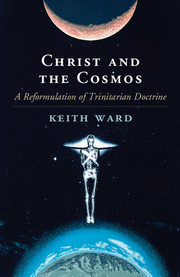Book contents
- Frontmatter
- Contents
- Preface
- Acknowledgements
- PART I THE THREEFOLD NATURE OF THE DIVINE BEING
- PART II THE BIBLICAL SOURCES OF TRINITARIAN THOUGHT
- PART III THE TRINITY, IMMANENT AND ECONOMIC
- 11 Why Three?
- 12 The Trinity and Revelation
- 13 Hegel and Modern Theology
- 14 The Immanent Trinity
- 15 The Identity of the Immanent and the Economic Trinity
- 16 Hegel Again
- 17 What Creation Adds to the Trinity
- 18 The Epistemic Priority of the Economic Trinity
- 19 The Trinity and Naive Realism
- 20 The Trinity and the Cosmos
- 21 Revelation and the Immanent Trinity
- PART IV THE SOCIAL TRINITY
- PART V THE COSMIC TRINITY
- Bibliography
- Subject Index
- Name Index
15 - The Identity of the Immanent and the Economic Trinity
from PART III - THE TRINITY, IMMANENT AND ECONOMIC
Published online by Cambridge University Press: 05 September 2015
- Frontmatter
- Contents
- Preface
- Acknowledgements
- PART I THE THREEFOLD NATURE OF THE DIVINE BEING
- PART II THE BIBLICAL SOURCES OF TRINITARIAN THOUGHT
- PART III THE TRINITY, IMMANENT AND ECONOMIC
- 11 Why Three?
- 12 The Trinity and Revelation
- 13 Hegel and Modern Theology
- 14 The Immanent Trinity
- 15 The Identity of the Immanent and the Economic Trinity
- 16 Hegel Again
- 17 What Creation Adds to the Trinity
- 18 The Epistemic Priority of the Economic Trinity
- 19 The Trinity and Naive Realism
- 20 The Trinity and the Cosmos
- 21 Revelation and the Immanent Trinity
- PART IV THE SOCIAL TRINITY
- PART V THE COSMIC TRINITY
- Bibliography
- Subject Index
- Name Index
Summary
One main reason many theologians have been persuaded that God must be as God appears to humans is to be found in Karl Rahner's The Trinity, first published in 1967, which contains the ‘Rule’ that ‘The “economic” Trinity is the “immanent” Trinity and the “immanent” Trinity is the “economic” Trinity’ (Rahner, 1979, p. 22). As Rahner goes on to expound it, this rule means that there is one God in three forms of subsistence (very much as in Barth), both in relation to creation and considered in itself alone. It is in that sense that the Trinity is the same both in itself and in relation to creation. This leaves other senses in which the economic and immanent Trinities are different. For instance, the Trinity without creation would obviously have no relations to non-divine entities. It would not enter into created reality, redeem others or sacrifice itself, or include created beings within its own nature. It would presumably not suffer or take risks or exhibit compassion, and it would not unite itself to human nature as it is thought to have done in Jesus. In all these ways the immanent Trinity would not be identical in its acts or in its forms of subsistence with the economic Trinity.
Why, then, does Rahner insist on identity in this case? It seems to be because he thinks that if there were no such identity, ‘That which God is for us would tell us absolutely nothing about that which he is in himself’ (Rahner, 1979, p. 30). The way God appears to us in Jesus would tell us nothing about what God really is. This, however, seems a huge overstatement. As far as we can tell, God could very well tell us much about the divine being without actually appearing to us at all. For instance, God could reveal in words that God is the creator of everything but Godself. That would tell us something very important about God, but sets of words are not at all identical with the being of God.
- Type
- Chapter
- Information
- Christ and the CosmosA Reformulation of Trinitarian Doctrine, pp. 108 - 110Publisher: Cambridge University PressPrint publication year: 2015



